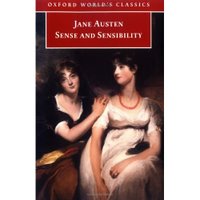I Am Still Alive and Reading
 Sorry about never writing. The only time I ever have to read is after midnight sometime, depending on when I get off work. Oh the joys of life!
Sorry about never writing. The only time I ever have to read is after midnight sometime, depending on when I get off work. Oh the joys of life!Okay, so it seems to be well understood that Jane Austen is amazing and the author of the classics that most people have read and love b/c of the characters she creates and their timeless tales of love and friendship. Having already experienced the joys of her genius while reading Emma and Pride and Prejudice, I can honestly say that I agree with that understanding whole heartedly. And Sense and Sensibilty is no exception. At first, I admit, it was hard for me to set my mind back a couple centuries and focus on what I was reading b/c of the Elizabethan language and Austen's seemingly long-winded descriptions of events. Despite this setback, it wasn't long for my modern brain to adjust to the style and get sucked right into the life of Elinor and Marianne Dashwood. They are characters who, similar to both Emma Woodhouse and Elizabeth Bennett, the reader cannot help but admire b/c of their individual minds and strengths.
Elinor is a thoughful and devoted sister and daughter who is considerate of all yet is reserved in her attitude and communication (thus comes the sense). Marianne is quite the opposite. She is full of emotion and romance (here is the sensibility) yet has few reservations about revealing her thoughts and feelings to the world. Throughout the novel, the reader knows that all will be well with the Dashwoods but it is the path to the happy ending that is clouded with questions of how and when. For Marianne, the imaginative and lively girl who has dreams of perfection in love, the ending seemed to have been exactly as she has hoped. But her ideals came crashing to the floor when a scandal was revealed and her love vanished leaving her hurt and confused. Elinor, on the other hand, suffered from a secret ache as the man she loved was confidetially revealed to her to be engaged to a woman who she could never possibly admire due to the woman's lack of sense and propriety. The sisters both learned from their trials and became stronger coming to rely on one another for the sense that they needed in their mixed up and painful worlds. Sense and Sensibility is a beautiful tale of love of family and finding happiness when all seems lost. The end is touching as one reads of Marianne's turn from a zealous romantic and outspoken child to a mature woman who has experienced the joys of love, lost herself in the pain of heartache, and found herself a new and wiser being through the example of her patient and good sister who is her anchor through all things. It is b/c of this turn about that she is able to finally find lasting love and happiness. Elinor's ending is equally pleasing as she is ultimately blessed with her secret wish of marrying the one man she thought she could never have. As always, Jane Austen has delivered a romantic and witty tale that has been able to overcome the barriers of time and will continue to endure in the hearts of readers for years to come.








